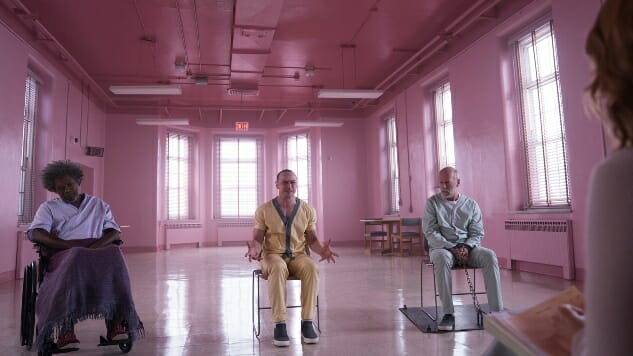Glass
Images via Jessica Kourkounis/Universal Pictures
1. For a movie that’s supposedly a sequel 18 years in the making, Glass sure does feel like it was put together in a hurry. After the (mostly justified) success of Split, and a post-credit sequence that placed it in the heretofore unexplored Unbreakable Cinematic Universe, writer-director M. Night Shyamalan took advantage of the biggest hit he’s had since his heyday by tying it to one of the films that made his name in the first place. There’s a reason the Shyamalan brand had faded before then—so much so that he needed to start making found-footage thrillers like The Visit and align with Blumhouse to get himself bankable again—and it is apparent in every second of Glass. Shyamalan hasn’t so much made a sequel to Unbreakable as he’s made a meta-commentary on it and on the process of making movies out of comic books. Unfortunately, the meta-commentary seems to exist only to bolster his own ego, to scream out to the world that his comic book movie is smarter than the aforementioned comic book movies. The old Shyamalan is back, reminding us: Oh yeah, there was a reason we all stopped watching so long ago.
2. We get bewildering little backstory on any of our main characters, particularly David Dunn (Bruce Willis), the man who could not be killed who, in the end of Unbreakable, turned out to be a superhero. (With a particularly strange Kryptonite of water.) Dunn has apparently just been hanging out with his son (played again, and played well, by Spencer Treat Clark) at their security firm, with the boy acting as dispatcher to his father’s nighttime excursions to beat down robbers and miscreants. Dunn is tracking quite the miscreant in James McAvoy’s Kevin/The Beast/24 Other Personalities, and the movie kicks off with a clumsily staged fight between them, two of the protagonists of two of Shyamalan’s most successful movies battling each other so quickly one wonders why the director’s firing his narrative bullets so quickly. Inevitably, the police capture both men and put them in a facility for the criminally insane, along with Samuel L. Jackson’s Mr. Glass (who has apparently just been chilling there for 18 years, waiting for someone to show up), where they are studied by a psychologist (Sarah Paulson) who, get this, specializes in people who mistakenly think they are superheroes. Oh, and Casey (Anya Taylor-Joy), the heroine of Split, shows up, mostly to remind us of how much more of a character she had to play in that movie.
3. When Unbreakable came out, Shyamalan’s big twist—that this actually was just a real-life comic book origin story—had real zest and a clever kick: He tricked us into watching a different genre movie than the one we thought we were watching. But Shyamalan’s obsession was with those sort of narrative tricks rather than comic book conventions themselves, so going back to the well here—and having Mr. Glass’s theory that all comic books are secret histories of extraordinary people be the foundational drive of the movie—does him no favors. Fact is, we have all seen a lot of comic book origin stories in the last two decades, movies by people who obsess over and adore comic books, who both play with comic book conventions and upend them. We have seen just about every permutation of comic book plot at this point, but Shyamalan seems to think we have just stumbled into this, as if we came here to watch him deconstruct comic book movies rather than to, you know, make one. Glass is a comic book movie by a guy who does not seem to like comic books…or even read them.